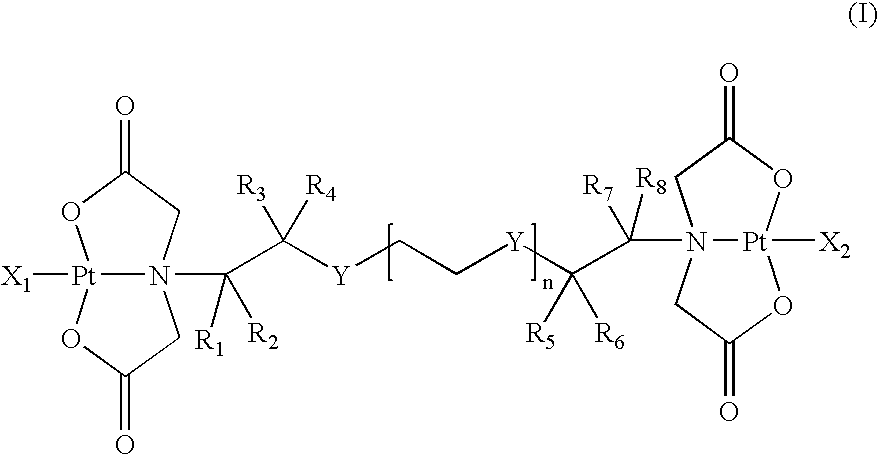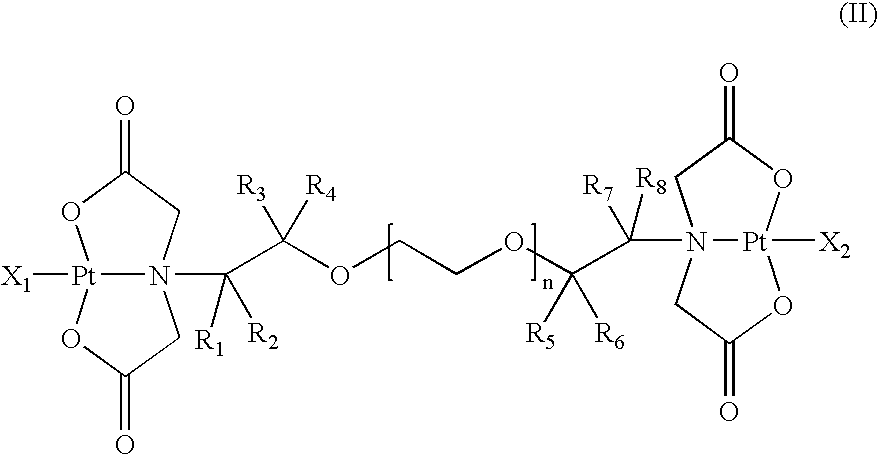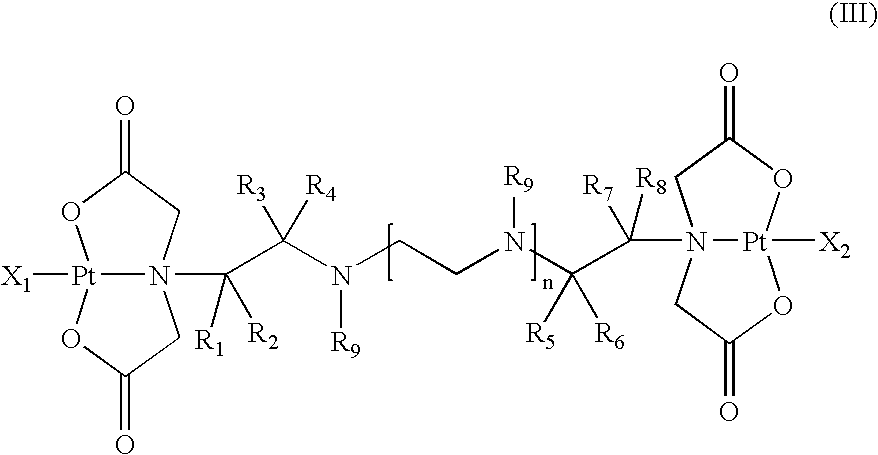Multinuclear platinum compounds
a platinum compound and multi-nuclear technology, applied in the field of multi-nuclear platinum compounds, can solve the problems of high dosing, high toxicity of cisplatin, and less tumor-resistance activity of carboplatin
- Summary
- Abstract
- Description
- Claims
- Application Information
AI Technical Summary
Benefits of technology
Problems solved by technology
Method used
Image
Examples
example 1
Preparation of Ethylene Glycol-bis-(β-aminoethyl)-N,N,N′,N′-tetraacetic-acid-diplatinum
[0137]To cisplatin (Saiquest, India) ([Pt(NH3)2Cl2]) solid (1 g) was added 100 ml water with constant stirring. The entire solution was kept under stirring at about 60° C. until a clear solution was obtained (about 30 minutes).
[0138]Ethylene glycol-bis-(β-aminoethyl)-N,N,N′,N′-tetraacetic-acid (EGTA) Acros Organics, Belgium) (0.426 g) was neutralized to pH about 9 using 1N NaOH (5 ml) to yield a clear solution, which was then diluted to 50 ml with water. The resulting sodium ethylene glycol-bis-(β-aminoethyl)-N,N,N′,N′-tetraacetate solution (1 ml) was added dropwise to the cisplatin solution prepared as described above. The reaction mixture was stirred at about 60° C. for 3 hours. The temperature was then lowered to about 50° C., and the solution was allowed to stir for another 3 hours. The reaction mixture was refrigerated overnight. The solution was filtered using a 0.45 micron filter to remove ...
example 2
Preparation of 1,3-Diamino-2-hydroxypropane-N,N,N′,N′-tetraacetic-acid-diplatinum
[0140]Method A. Silver nitrate (Aldrich) solution (0.717 g dissolved in 75 ml water) was added to cisplatin (Saiquest, India) ([Pt(NH3)2Cl2]) solid (0.709 g) dropwise with constant stirring. The entire solution was stirred at about 70° C. until silver chloride precipitation was complete (about two hours). The solution was then filtered using a 0.45 micron disposable filter.
[0141]1,3-Diamino-2-hydroxypropane-N,N,N′,N′-tetraacetic-acid (DAPTA) (Aldrich) (0.693 g) was neutralized to pH about 3 using 1N NaOH (3 ml) to yield a clear solution, which was then diluted to 70 ml with water. Cisplatin diaminedinitrate platinum (II) solution prepared as described above was added dropwise to the sodium diaminopropyl-N,N,N′,N′-tetraacetate solution. The reaction mixture was stirred at about 60° C. for 2 hours. The heat was removed and the solution was stirred at room temperature overnight, and then filtered.
[0142]The...
example 3
Preparation of Diethylenetriamine-N,N,N′,N″,N″-pentacetic-acid-diplatinum
[0144]Silver nitrate (Aldrich) solution (0.794 g dissolved in 80 ml water) was added to cisplatin (Saiquest, India) ([Pt(NH3)2Cl2]) solid (0.709 g) dropwise with constant stirring. The entire solution was stirred at about 70° C. until silver chloride precipitation was complete (about two hours). The solution was then filtered using a 0.45 micron disposable filter.
[0145]Diethylenetriamine-N,N,N′,N″,N″-pentaacetic acid (DTPA) (Aldrich) (0.464 g) was neutralized to pH about 9 using 1N NaOH (4 ml) to yield a clear solution, which was then diluted to 50 ml with water. The cisplatin diaminedinitrate platinum (II) solution prepared as described above was added dropwise to the sodium diethylenetriamine-N,N,N′,N″,N″-pentaacetate solution. The reaction mixture was stirred under nitrogen atmosphere at about 60° C. for 2 hours. The heat was removed and the solution was stirred at room temperature overnight under nitrogen, ...
PUM
| Property | Measurement | Unit |
|---|---|---|
| temperature | aaaaa | aaaaa |
| temperature | aaaaa | aaaaa |
| temperature | aaaaa | aaaaa |
Abstract
Description
Claims
Application Information
 Login to View More
Login to View More - R&D
- Intellectual Property
- Life Sciences
- Materials
- Tech Scout
- Unparalleled Data Quality
- Higher Quality Content
- 60% Fewer Hallucinations
Browse by: Latest US Patents, China's latest patents, Technical Efficacy Thesaurus, Application Domain, Technology Topic, Popular Technical Reports.
© 2025 PatSnap. All rights reserved.Legal|Privacy policy|Modern Slavery Act Transparency Statement|Sitemap|About US| Contact US: help@patsnap.com



